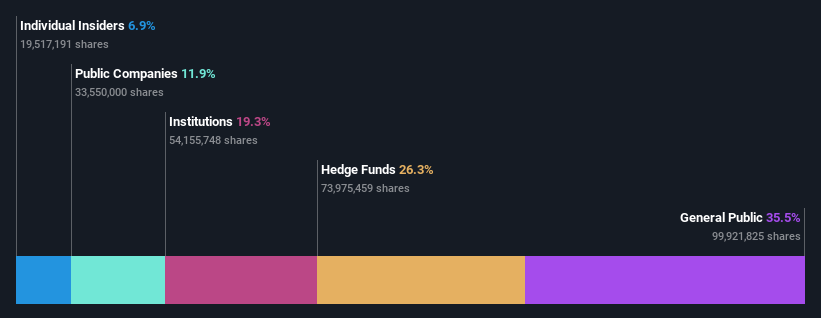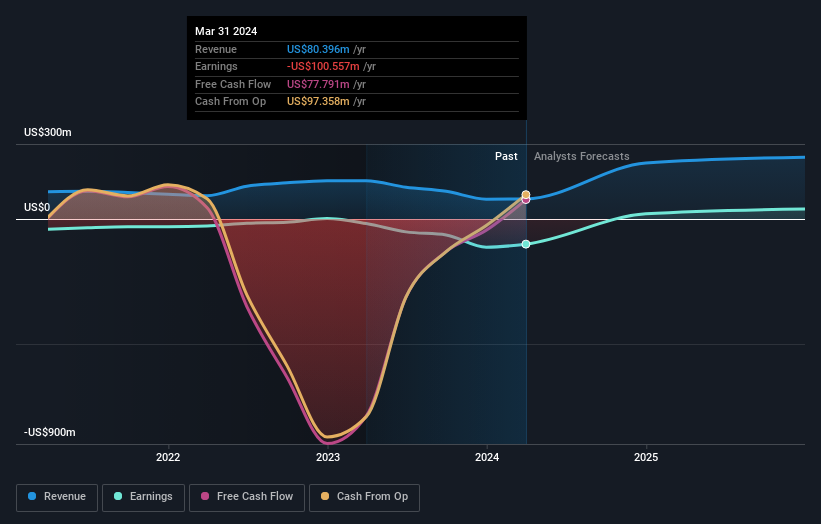Individual investors account for 36% of ECN Capital Corp.'s (TSE:ECN) ownership, while hedge funds account for 26%
Key Insights
The considerable ownership by individual investors in ECN Capital indicates that they collectively have a greater say in management and business strategy
A total of 5 investors have a majority stake in the company with 54% ownership
To get a sense of who is truly in control of ECN Capital Corp. (TSE:ECN), it is important to understand the ownership structure of the business. We can see that individual investors own the lion's share in the company with 36% ownership. In other words, the group stands to gain the most (or lose the most) from their investment into the company.
Meanwhile, hedge funds make up 26% of the company’s shareholders.
Let's delve deeper into each type of owner of ECN Capital, beginning with the chart below.
Check out our latest analysis for ECN Capital
What Does The Institutional Ownership Tell Us About ECN Capital?
Many institutions measure their performance against an index that approximates the local market. So they usually pay more attention to companies that are included in major indices.
ECN Capital already has institutions on the share registry. Indeed, they own a respectable stake in the company. This can indicate that the company has a certain degree of credibility in the investment community. However, it is best to be wary of relying on the supposed validation that comes with institutional investors. They too, get it wrong sometimes. When multiple institutions own a stock, there's always a risk that they are in a 'crowded trade'. When such a trade goes wrong, multiple parties may compete to sell stock fast. This risk is higher in a company without a history of growth. You can see ECN Capital's historic earnings and revenue below, but keep in mind there's always more to the story.
It would appear that 26% of ECN Capital shares are controlled by hedge funds. That catches my attention because hedge funds sometimes try to influence management, or bring about changes that will create near term value for shareholders. The company's largest shareholder is North Peak Capital Management, LLC, with ownership of 15%. Skyline Champion Corporation is the second largest shareholder owning 12% of common stock, and Voss Capital, LLC holds about 11% of the company stock. Furthermore, CEO Steven Hudson is the owner of 5.7% of the company's shares.
To make our study more interesting, we found that the top 5 shareholders control more than half of the company which implies that this group has considerable sway over the company's decision-making.
While it makes sense to study institutional ownership data for a company, it also makes sense to study analyst sentiments to know which way the wind is blowing. There are a reasonable number of analysts covering the stock, so it might be useful to find out their aggregate view on the future.
Insider Ownership Of ECN Capital
The definition of company insiders can be subjective and does vary between jurisdictions. Our data reflects individual insiders, capturing board members at the very least. The company management answer to the board and the latter should represent the interests of shareholders. Notably, sometimes top-level managers are on the board themselves.
Most consider insider ownership a positive because it can indicate the board is well aligned with other shareholders. However, on some occasions too much power is concentrated within this group.
Shareholders would probably be interested to learn that insiders own shares in ECN Capital Corp.. It has a market capitalization of just CA$469m, and insiders have CA$33m worth of shares, in their own names. This shows at least some alignment. You can click here to see if those insiders have been buying or selling.
General Public Ownership
With a 36% ownership, the general public, mostly comprising of individual investors, have some degree of sway over ECN Capital. While this size of ownership may not be enough to sway a policy decision in their favour, they can still make a collective impact on company policies.
Public Company Ownership
We can see that public companies hold 12% of the ECN Capital shares on issue. It's hard to say for sure but this suggests they have entwined business interests. This might be a strategic stake, so it's worth watching this space for changes in ownership.
Next Steps:
It's always worth thinking about the different groups who own shares in a company. But to understand ECN Capital better, we need to consider many other factors. For instance, we've identified 2 warning signs for ECN Capital that you should be aware of.
If you are like me, you may want to think about whether this company will grow or shrink. Luckily, you can check this free report showing analyst forecasts for its future.
NB: Figures in this article are calculated using data from the last twelve months, which refer to the 12-month period ending on the last date of the month the financial statement is dated. This may not be consistent with full year annual report figures.
Have feedback on this article? Concerned about the content? Get in touch with us directly. Alternatively, email editorial-team (at) simplywallst.com.
This article by Simply Wall St is general in nature. We provide commentary based on historical data and analyst forecasts only using an unbiased methodology and our articles are not intended to be financial advice. It does not constitute a recommendation to buy or sell any stock, and does not take account of your objectives, or your financial situation. We aim to bring you long-term focused analysis driven by fundamental data. Note that our analysis may not factor in the latest price-sensitive company announcements or qualitative material. Simply Wall St has no position in any stocks mentioned.
Have feedback on this article? Concerned about the content? Get in touch with us directly. Alternatively, email editorial-team@simplywallst.com

 Yahoo Finance
Yahoo Finance 

